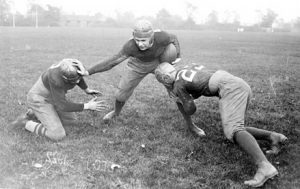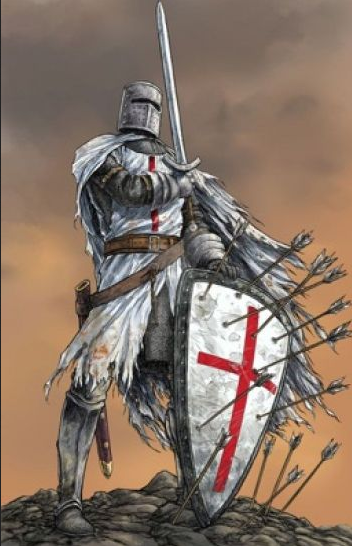 There are many elements of a society or culture that help to define it. For the Men of the West, few things are more definitive than Football, the greatest sport yet invented by mankind. While some folks want to disparage it as “bread and circuses,” the Men of the West recognize sport for what it is – a great activity that furthers our cultural aims.
There are many elements of a society or culture that help to define it. For the Men of the West, few things are more definitive than Football, the greatest sport yet invented by mankind. While some folks want to disparage it as “bread and circuses,” the Men of the West recognize sport for what it is – a great activity that furthers our cultural aims.
Sport has always been a part of Western Culture. The Greeks, Romans, and the later European powers all reveled in the importance of physical sports. The Greeks played Harpaston, which is most likely an early forerunner of modern football (as are Soccer and Rugby). To deny the efficacy of playing sport is to deny the very essence of Western Civilization.
Football’s greatness is seen from two angles: external and internal. The former addresses how the sport impacts the culture as a whole, while the latter considers how it affects those who are engaged in the activity.
Socially-speaking, football encourages community. There is a reason that entertainers picked up on the fascination with “Friday Night Lights.” In small towns across America, entire towns put down their tools, close their shops, and head to the local stadium to cheer on their local team. It is a time when families, friends, and neighbors gather in unity to cheer for a common goal.
Some anecdotal evidence: after losing a hard-fought game against a rival school, Theophrastus was driving home, when a local Sheriff’s Deputy pulled him over. Approaching the driver’s side window, the officer complained, “Dammit man, y’all cost me a case of beer! I had a bet with another deputy from the other town.” No ticket was issued. It was simply a time of communal commiseration. Ever after, when the two saw each other, one would mention the case of beer, and chuckle.
The fact is that small towns across the country join together in a very real way, thanks to football. Memories are made, relationships are tried and strengthened, and community is developed. It is a powerful thing.
Another important social aspect is intimately tied to personal relationships. There is a reason that the desirable girls chase after the football stars and not Chester the Chess Champion. It is not mere trickery or superficiality. There is something real and virile about a young man who willingly places his health on the line to gain victory for his community, and demonstrates his physical prowess. Young ladies recognize this, and respond accordingly. They instinctively know that if threatened, Joe Football is a much better protector than Chester.
There are those internal components to consider, as well. Are you interested in strategy? Sure, chess is strategic, and it is a fine game. It is also very two-dimensional. Pieces always move by the rules. Pawns will not act like rooks or bishops. On the gridiron, there is an element of uncertainty, where the opponent does not always do what is expected, nor remain limited within the rules. Football players must learn to respond quickly and decisively, if they want to win.
In fact, Football is very much a martial training, and in its earliest days was often forbidden on college campuses (where it began) for being too violent. The Ivy League schools that popularized the sport intended for the activity to toughen these young men up, so that they would be prepared for war. It was not simply a hobby, but a real-life training exercise for warriors. They were building warriors of the gridiron.
Of course, using such techniques has been long standing tradition amongst Men of the West. Consider Scottish Highlander games, where stone throwing, Caber tossing, and the like were used to keep the men in fighting shape, especially during times when weapons were outlawed. Go watch the early scenes of Mel Gibson’s Braveheart for an example.
Not only is Football an important social activity, and not only does it train young men to be prepared psychologically for battle, it also helps to keep them physically fit. The young men must train relentlessly. Most small towns have weight-training programs that start in elementary school, so that the boys are ready to play football, when they are old enough. They engage in both aerobic and anaerobic exercise in order to be fit.
Bread and circus? Give me a break. Football prepares Men of the West to propagate, defend, and enhance the culture. It is not only good, it is indispensable. If you say otherwise, you are wrong, and most likely not a true Man of the West.
On the Greatness of Football
16 Comments
Leave a Reply
Latest from Culture

Dangerous Left Wing Rhetoric
On Saturday, July 13, 2024, an assassin came within inches of murdering Donald Trump on a live broadcast. Democrat talking heads immediately split into two camps: some said Trump staged the shooting

Movie Review: Streets of Fire
Underrated. Yes, the acting is forced, the lines are flat, the sets limited, but it makes up for it by being awesome. It's more of a modern Western than anything.

Calvin Coolidge on Independence Day
Speech Given July 1926 We meet to celebrate the birthday of America. The coming of a new life always excites our interest. Although we know in the case of the individual that

Edward the Black Prince
"Valiant and gentle...the flower of all chivalry in the world at that time.”

The Weimar Years – Part 5
Summary of the German Revolution, 1918-1919.




The thrust of the article was that men playing football is good for the men playing football and for the non-men spectators of the sport. Sounds about right. Society would be better off if more men got off their butt and did anything physical,, rather than sit on the couch or in the stadium cheering other men on (unless of course you personally know the players, such as your son playing). Bread and circuses do just that; keep you from doing something that is more worth your time. Watching is not doing. Don’t watch porn, get a woman. Don’t watch other guys play sports, get up and do something.
You are presenting a binary option. Young men play the sport, and they get physical benefit, etc. At the same time, it is a community experience, where neighbors join in common cause. In addition, those older folks provide support to the athletes, encouraging their pursuits. This 3 hours on Friday night does not preclude men from doing other things during the week, but is simply a time to encourage their younger neighbors.
Not mention the life lessons. Work Ethic. Perseverance. Class. Respect. The old are there to share that wisdom to the young through the vehicle of sport.
Another thought on this issue – to clarify, it is a time of community. It seems the original comment here is focused on the individual, rather than the larger community. Individuals must be a part of a family, and families need to be a part of their community. If we ignore that connection, we do so at our own peril.
Roll Tide.
Why you no like Globo Kickyball?
Because of the prancing.
AND THE HOMOSEXUALITY
no
This might be a good time to contrast the ‘concept’ of football with the reality of the NFL.
I too love watching High school football. It is indeed a community driver. But the moment it turns into ‘college ball’ and begins to feed into national football, all community support, all the psychological and physical benefits of it drift away through the window… It immediately mutates into the worst sort of bread and circuses.
If there is a happy medium between the two extremes of ‘high school community building’ and ‘sportscenter african gladiators’ I have yet to see it. Baseball is a far better example.
I just wrapped up my eighth season coachin high school football. (Freshman level). I played for ten seasons as a kid as well. Nothing in our culture has given me more than football. In the twenty years between my last game as a player and first game as a coach, I had no activity that combined physical peril, creative outlet and camaraderie. I tried to fill each with specific activities like weight lifting, music and church softball. But none of them came close.
Moreover, I get to apply mindset techniques as a coach. This season we started out 2-3 and it looked like we were headed for a disaster of a year the likes of which our school has seen far too often. It would have been easy to go through the motions and just tell the guys to go out and have fun, to not worry about the score. Normally, I’m a position coach (offensive and defensive line) whose job is to teach technique and how to block someone else’s plays. Although I’ve always done my best to inspire my group to play harder and work on their technique, come game time my control over the outcome was limited. I’ve been head coach twice but only allowed to run my own system once. We were above .500 the year I was in control and only two games the year I had to run someone else’s stuff. This year, I was offensive coordinator and had full control designing the offense and calling the plays. So instead of rolling over after our third straight loss, I used a little mindset technique. I think Cernovich calls it framing, but I’ve always called it foreword purpose. Every Monday after a loss. I had a new play or formation that answered a problem we had the week before. That way, the players knew their coaches were working for them and they had a plan for getting better.
And we got better. By the time we hit league play, we were dialed in and had an answer to everything the other team threw at us. We beat teams we’ve never beat in the decade and a half I’ve been at the school. And we beat them decisively. We went 4-1, and after our one loss, the opposing coach told us we were the most physical, disciplined team they’d played all year.
Yesterday, we beat a school that usually blows us out by forty points. We were so in control of the game, we let our deep reserves play most of the 2nd half, resulting in a score much closer than it should have been. But even once the other team got within three scores, we didn’t feel threatened.
I’m telling you, Men of the West should coach. Preferably football. You’ll get more out of it than just about anything else. Heck, I’m even a better guitarist than ever because of it. But that’s another story.
You are doing God’s own work here.
That’s another part of it. Trying to give these poor kids a Godly example. It’s the hardest part these days.
This is an outstanding piece.
Thank you, kind sir.
Looked through the sports archives and i agree! One of my favorite things is the friendships that are built when men, young men included, go through tough things together.
And every football practice and game is tough! And the game of football is great because the men who self sacrificially block for others have a role. And so does the running back who gets the glory, but also puts his body on the line in a way different than the blockers. And i love the idea of the best women wanting football players and strong proud Patriarchal young men!
Long live those kind of men and women (like my wife)!